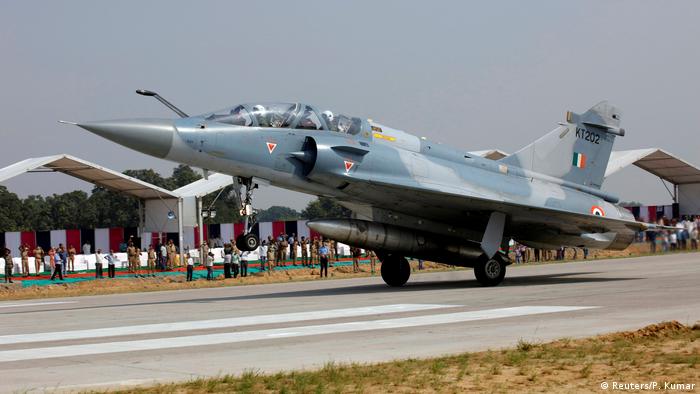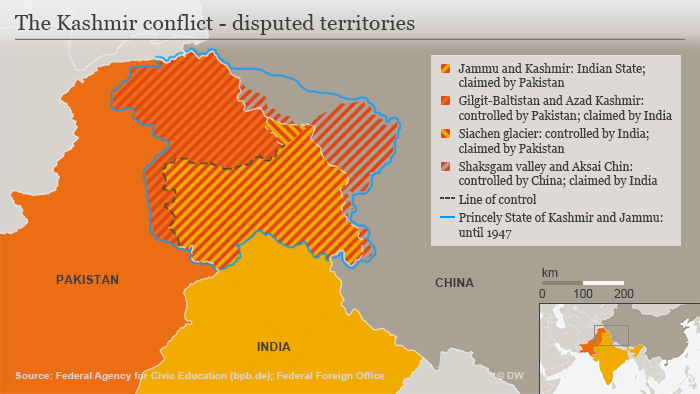Pakistan vows retaliation for India’s airstrike on alleged militant camps
India and Pakistan may be on the brink of yet another violent conflict after Indian jets launched strikes on suspected militant camps on Pakistani soil. Many fear an escalation could be devastating for the entire region.

India said on Tuesday that its air force had carried out strikes inside Pakistan, targeting camps run by the Jaish-e-Mohammad (JeM) terrorist group. New Delhi said it had managed to kill a “very large number” of fighters in the operation.
“A very large number of Jaish-e-Mohammed terrorists, trainers, commanders and groups of jihadis who were being trained for fidayeen [suicide] action” have been killed, India’s Foreign Secretary Vijay Gokhale said at a press conference.
Security officials in India told DW on condition of anonymity that the operation involved Mirage 2000 aircraft, which flew across the Line of Control (LoC) and dropped 1,000 kilograms of bombs. The Mirage 2000 is a French-made single-engine fourth-generation fighter jet, manufactured by Dassault Aviation.
Read more: Rafale controversy: What you need to know about India’s fighter jet deal with France
JeM claimed responsibility for a recent deadly attack in Kashmir that claimed the lives of at least 40 Indian troops. India said the camps in Balakot, which was the target of Tuesday’s strike, were headed by Maulana Yusuf Azhar or Ustad Ghauri, the brother-in-law of JeM chief Masood Azhar.
Following the air strikes, speaking at an election rally in the northern state of Rajasthan, Indian Prime Minister Narendra Modi said, “The country is in safe hands.”
“I pledge on this soil, I will not let the country die, I will not let the country stop. I will not let the country bend. It is my promise to Mother India; I will protect your honor.”
Read more: Kashmir violence: Has Modi’s policy failed?
The move by the Indian air force marks a significant escalation, as the last time Indian military jets carried out strikes in Pakistan was during the 1971 war for the liberation of Bangladesh. And this marks the first such strike since India and Pakistan became nuclear powers. Even during the armed conflict between the two sides in Kashmir’s Kargil district in 1999, air incursions were described as inadvertent and not specifically planned by the air force.
In September 2016, however, the Indian military said it had carried out “surgical strikes” on militants across the de-facto border in the disputed Kashmir region. This was days after armed insurgents attacked an army base in India-administered Kashmir, killing 18 soldiers. At that time, Pakistan dismissed India’s claims about the strikes.
Criticism from Pakistan
On Tuesday, while India claimed it had successfully launched the attack against JeM camps inside Pakistani territory, Islamabad denied New Delhi’s assertions, saying that Pakistan’s air force managed to thwart India’s attempts.
In a tweet, Major-General Asif Ghafoor, the director general of Pakistan’s Inter-Services Public Relations, said: “Indian Air Force violated Line of Control. Pakistan Air Force immediately scrambled. Indian aircrafts gone back.”
He later added that the aircraft faced a “timely and effective response from Pakistan Air Force” and ended up releasing the “payload in haste while escaping which fell near Balakot.”
Pakistan has sharply criticized the Indian government’s move and said it will respond to India’s “uncalled-for aggression.” Islamabad also said senior civilian and military leaders are deliberating on crafting an appropriate response to New Delhi’s actions.
“India has today committed an aggression against Pakistan. I will call it a grave violation. .. This is a violation of the Line of Control and Pakistan has a right to respond in a befitting manner and right to self-determination,” said Pakistan’s Foreign Minister Shah Mahmood Qureshi.
A high-level committee chaired by Pakistani Prime Minister Imran Khan also reportedly decided to raise the issue at the United Nations and other international forums, including the Organization of Islamic Cooperation (OIC).
But some in Pakistan appear critical of the government.
“I am very disappointed by the government’s response. What befitting response is Pakistan talking about now; it should have shot down the Indian aircraft that violated Pakistani territory. It reflects the weakness of political will,” Talat A Wizarat, an ex-chairperson of the department of international relations at Karachi University, told DW.
“In the past, we allowed American drones to violate our airspace, which killed many people. This encouraged others to do the same,” he added. “From now on, the Pakistani government must give an order to shoot down any Indian aircraft that violates our airspace,” Wizarat said.
Indian praise for air force
Indian political leaders, cutting across party lines, appear to unanimously applaud the Indian air force and its strikes. Rahul Gandhi, leader of the nation’s main opposition Congress party, tweeted: “I salute the pilots of the IAF.”
Mamata Banerjee, the chief minister of the eastern state of West Bengal, tweeted: “IAF also means India’s Amazing Fighters. Jai Hind.”
Read more: Kashmiris face uncertain future as violence escalates
Some former Indian defense officials also praised India’s air force. “This action was needed and we have delivered the right message to the Pakistani establishment,” Raj Kadyan, a former deputy chief of the Indian army, told DW.
“Congratulations to the Indian Air Force. I didn’t expect the force to pull off such a performance. This is splendid,” said former air force chief A.Y. Tipnis.
A full-fledged armed conflict?
Diplomatic and trade relations between India and Pakistan have already nosedived in recent weeks. Following the Kashmir attack, India scrapped the Most Favored Nation status granted to Pakistan and imposed a 200 percent customs duty on its goods.
Although India says the attack by its air force was “pre-emptive” and “non-military,” Pakistan’s response now will likely decide whether the incident will trigger a full-blown armed conflict between the two countries.
Read more: Water wars: Are India and Pakistan heading for climate change-induced conflict?
“Pakistan is in a difficult situation. If it responds to this Indian violation of Islamabad’s airspace, it could escalate into a war that could engulf the entire region. But if it prefers to stay silent, then New Delhi would construe it as weakness,” Bakar Nujmuddin, from Pakistan’s National University for Science and Technology’s Global Institute for Peace and Stability, told DW. “I think Pakistan will have to respond to avoid being seen as weak.”
“On the diplomatic front, Pakistan needs to take the representatives of regional and international players and organizations to the site of the intrusion and convince them that it was the victim of Indian aggression,” he said.
“At the international level, India is heard more attentively than Pakistan,” said Nujmuddin; adding that “Islamabad needs to make efforts to convince the international community that it was a victim.”

